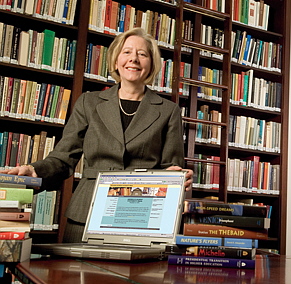






 |
||||
 |
 |
 |
 |
 |
 |
||||
|
A P R I L 2 0 0 7 I S S U E The Big Question
|
|
|
Kathleen Keane is director of the
Johns Hopkins
University Press Photo by Bill Denison |

Q:
Will university presses survive the Open Access movement
to make research available free on the
Internet? "On the surface, Open Access looks like the library community's response to the very high prices charged by commercial publishers for science and medical journals. The suggestion is that for those journals, we should move to a system whereby the author would pay a submission fee to the journal publisher out of the grant funding the research. The publisher would use those fees to pay for peer review, editing, design, and distribution, and access would be free. That's good for library budgets, but are we reducing costs or just moving them from Point A to Point B? If we move to Open Access this way, publishers can no longer sell journal copies or access to people outside academia, like corporate researchers. All funds would come from the academic community. From my perspective, that might ultimately cost the academic community more. Just because information is electronic does not make it free. "Frankly, I don't think this approach to Open Access would do harm to university presses, mainly because we are not heavily dependent on publishing science journals. Some have suggested we should publish humanities and social science journals or books in an open electronic manner. It seems unlikely that government funding or private philanthropy will increase enough to permit that, but if it did, university presses would have opportunities to serve our audiences in some interesting new ways. Whatever happens, there will always be a need to select, professionally prepare, and publish the very best scholarship — and to find a way to pay for that important process. We intend to remain a leader in this process, and already have a significant electronic presence through Project MUSE. I think the Open Access rhetoric gets people a little bit worked up, but at the end of the day everyone wants the same thing: a means to produce high-quality, peer-reviewed content and make it widely available. We want to be there to make that happen." |
 |
|
 The Johns Hopkins Magazine |
901 S. Bond St. | Suite 540 |
Baltimore, MD 21231
The Johns Hopkins Magazine |
901 S. Bond St. | Suite 540 |
Baltimore, MD 21231Phone 443-287-9900 | Fax 443-287-9898 | E-mail jhmagazine@jhu.edu |
|